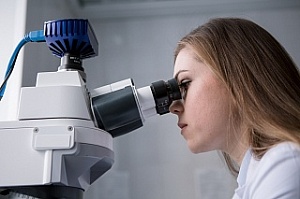Scientists at the TSU Laboratory of Translational Cell and Molecular Biomedicine, led by Julia Kzhyshkovska, a visiting professor from Germany, working with colleagues from the Tomsk Cancer Research Institute and Cardiology Research Institute, are investigating the behavior of macrophages. These cells, called big devourers, can play opposite roles: to protect the body from foreign pathogens or to trigger chronic inflammatory processes that promote the development of myocardial infarction and malignant tumors. The researchers intend to identify the factors that determine the inclusion of ‘good’ and ‘bad’ macrophages, which will enable developing new approaches to treating cancer and heart attack.
- The main objects of our research are monocytes and macrophages, - says Irina Mitrofanova, a member of the TSU Laboratory of Translational Cell and Molecular Biomedicine and a postgraduate student at the Tomsk Cancer Research Institute. - Monocytes mostly ‘live’ in the blood. Once they enter the tissue, they differentiate into macrophages, which can be of two types - M1 and M2. The first type eliminates foreign agents and suppresses pathological processes. But a tumor can reprogram these cells and attract them to their side, and then the macrophages change the phenotype to tumor-like and become no longer defenders, but enemies.
M2 macrophages can secrete molecules - growth factors that promote the development and metastasis of the tumor, aid the emergence of new blood vessels that provide it nutrition, and so on. All this complicates the course of the disease and significantly worsens the prognosis for the patient.
It has been established that M2 macrophages also play an important role in the development of cardiac pathologies. Cells with a changed phenotype are found in the myocardium of patients for whom the heart attack has led to death.
To learn how to block the activity of bad macrophages, it is necessary to learn what factors cause them to transform. The scientists will track these changes at the molecular and genetic level. In the project, they will conduct a series of studies involving patients with breast cancer. The scientists will compare the phenotypes of macrophages in women with a different course of the disease - with and without metastases, with relapses and without, and other features.
In addition, the researchers will assess the impact of preoperative chemotherapy on the function and phenotype of monocytes and identify their relationship to the severity of the disease and the body’s response to chemotherapy. Similar studies will be conducted with patients diagnosed with lung cancer and people who have had a heart attack.
Understanding the functioning of tumor-like macrophages and their precursors, monocytes, will help develop a personalized approach to prescribing chemotherapy and identify targets that need to be influenced to defeat cancer.
A separate block of the project will study the role of macrophages M2 in inflammatory processes that cause the rejection of implants that replaced damaged or lost bone fragments in patients.
Macrophages (from Greek μακρός (makrós) = large, φαγείν (phageín) = to eat) are cells in the body of humans and animals that are capable of actively capturing and digesting bacteria, debris from dead cells, and other foreign or toxic particles.

